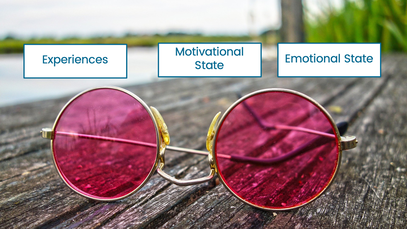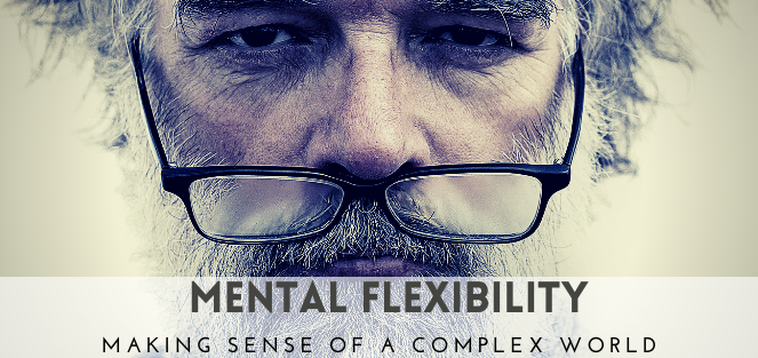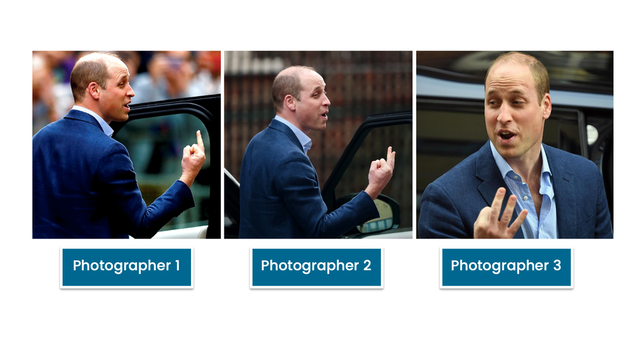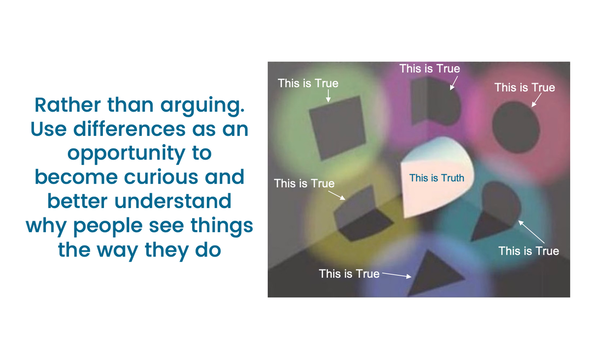|
Written & contributed by Georgia Ellis I have always found being human fascinating, and as I continued to dive into the different sciences that underpin our humanness, I soon learned there is still so much we don’t know… which makes me wonder, with the pace of scientific enquiry and discoveries, how long will it be before what I know today… is well… irrelevant and outdated? For Humans to get along with each other, there is a need for all of us to increase our capacity for critical thinking. To move from thinking our way is the right and only way and from hunkering down on outdated thinking and paradigms, to being curious enough to seek more information, look at things from every angle and formulate a flexible adaptive opinion. In other words, not being stubborn in thinking that the conclusion I came to today, will still be valid and relevant tomorrow when more or new information comes to hand. Whether they know it or not, everyone lives most of their life from a biased vantage point, their Mindset. Our mindset is as unique as our thumbprint. It consists of our various values, perceptions, conclusions, assumptions and beliefs. All of these components create a filter or lens that you view the world through. To be able to see things differently, to appreciate new and diverse information, and sometimes opposing perspectives, and even solve wicked problems, we all need to be able view life from different vantage points. We must notice when we are experiencing cognitive dissonance and at least be open to the perspectives of those who challenge and disrupt our long held (and sometimes outdated) patterns of thinking. Open and curious dialogue can help us bounce between the black and white thinking that keeps us stuck, to meander and experiment in the grey between what we believe is right and wrong. We need to know how to get off of our self-imposed playing field and up into the grandstand to see the game of life being played out before our eyes. Then, and only then, can we join the dots, make the connections, see where we have gone wrong and more importantly what moves to make to improve the game of life, for ourselves and everyone. Your ability to see life from new or even opposing points of view is one element of critical thinking, it’s a mental muscle and similar to your physical muscles, the more you use it, the stronger it becomes. In 2018 a picture of Prince William that went viral. It showed what looked like the prince giving the “bird” to a crowd of onlookers. However, different photographers captured the same moment from different vantage points, revealing that Prince William was actually holding up three fingers indicating the birth of his third child. If you had only seen the first image, you would have likely created a story about the prince, your clever brain filling in the blanks to make an erroneous assumption. This is just how we work, and if you didn't have the opportunity to see the same event from a different vantage point, you likely would hold on to your incorrect assumption for some time. This simple example shows you how even a slight change of view or stepping into the shoes of someone else (in this case a different photographer), allows you to perceive an event, problem or situation in a different way. It also builds your ability to think critically and enhances your mental complexity. Perceptions are extensions of repeated and revisited thoughts and feelings. Strong emotions create very strong perceptions. You will only see the world, and people according to how your brain has been wired. This means that your beliefs and perceptions are completely attached to your past experiences and past thinking. Your perception may not be based on actual events and how they happened, it will be based on the thoughts, feelings and mental state at the time of an event. Your perception is formed about a person, situation, thing or experience once you become aware of it. Your brain fills in any missing information from past memories and experiences or by asking questions or making assumptions. Finally, you develop an understanding or belief about the person, situation, thing or experience. It becomes your point of view. How you saw the situation, how it made you feel and the thoughts you had about it creates your unique personal experience which will often be at odds with how other people who were involved in the same situation experienced it. This is why the people we live and work with have a different point of view to ours. Often causing conflict, confusion and even a break down in relationships, especially when people stubbornly hold on to their experience as the ultimate truth. This does not mean that there is no truth in someone’s account of a situation, there is often an element of truth to a person’s experience. Sometimes we can see their truth and sometimes due to our different perspective we can’t see what they see, often leading to disagreement. Rather than arguing, you can use a difference of opinion or perspective as an opportunity, an invitation, to become curious and better understand how or why people see things the way they do.  The three factors that can influence your perception are your experiences, your motivational state and your emotional state. In different motivational or emotional states, you will react to or perceive something in different ways. Also, in different situations you might employ a "perceptual defence" where you "see what you want to see" and disregard the facts. This is commonly known as ‘confirmation bias’, a unique way to distort reality to have it fit into how we believe the world to be. Steve Jobs is well known for doing this, his success was largely driven by holding on to an idea or point of view that brought Apples products to life. When people, including his own team, believed things couldn’t be done, Steve often saw things differently. Biographer Walter Isaacson writes that Robert Friedland "taught Steve the reality distortion field." (RDF). The RDF was said to be Steve Jobs' ability to convince himself, and others around him, to believe almost anything. He used a mix of charm, charisma, bravado, marketing prowess, appeasement and persistence. This approach was said to distort his co-workers' sense of proportion and scales of difficulties and to make them believe that whatever impossible task he had at hand was possible. This was the upside of his distorted reality, however Jobs also used the RDF to claim other peoples ideas as his own, even pitching an idea back to its originator, after dismissing it days earlier. Knowing that your point of view is based on your past thinking, and possibly outdated beliefs allows you to expand and strengthen your perception by taking on new points of view, perhaps like Steve, believing in possibility when no one else does. This is especially useful when you are faced with a problem you can’t solve. Changing the way you look at a problem, or changing the thoughts and beliefs you have about an issue can often lead to solutions and save many an argument. Most arguments are caused simply by the different ways in which we all see the world. Doing your best to put yourself in someone else's shoes can help to build stronger and more meaningful professional and personal relationships. In our Life Reloaded suite of programs, we explore tools designed to help broaden perspective and increase mental complexity. We look at how a team or individual can map differing points of view to solve organisational challenges and polarising viewpoints. We also explore how to use a simple activity (shared below) to help people step into the shoes of anybody, at any time, in any given situation. Einstein has been attributed as saying “You can’t solve a problem with the same level of thinking that caused it” You can’t solve a problem with the same level of thinking that caused it We tend to approach the world from the same perception that causes and creates our issues, making it difficult to find a solution or a way through it. I personally started using this simple activity after reading about a similar approach recommended in the classic book “Think & Grow Rich”. This is how easy it can be:
Although it appears simple this activity allows you use your imagination to see things from another person’s point of view. Imagining that you are someone else shifts your thinking patterns, helps you to temporarily suspend your own mindset, release your biased point of view allowing new information to flow to you. You may find this to be a simplistic way of looking at your problems, however I encourage you to experiment with it the next time you feel stuck. With a deeper understanding of perception and the right tools to shift your point of view, you will build confidence in your ability to resolve conflict, solve your own problems and shift your perspective in a powerful way. Learning to walk in another persons shoes and manage polarisation are great tools to have, especially in the world we live in. This form or critical thinking allows you to tap into new information and to see the upside of the things that are opposite to what you personally value, and acknowledge that your side isn’t perfect, it allows you and those you live and work with to be better humans together. Contact Blue Chip Minds to learn how to strengthen yours or your teams perception and increase mental flexibility.
|
Authors
Our Contributors are a mix of passionate and switched on Humans ready to share their, career, business, well-being, leadership and performance insights with you so you can be the architect of your own extraordinary future! Archives
May 2024
Categories
All
|
Global professional development solutions for individuals and organisations.
Working with Individuals and organisations in;
Australia | Singapore | Hong Kong | United States | India | United Kingdom | Dubai | China | Poland
Malaysia | New Zealand | Japan | Belgium | Austria | South Africa | Brazil | Canada
Working with Individuals and organisations in;
Australia | Singapore | Hong Kong | United States | India | United Kingdom | Dubai | China | Poland
Malaysia | New Zealand | Japan | Belgium | Austria | South Africa | Brazil | Canada
|
We acknowledge the Traditional Custodians of the land on which we live, work, meet and play. This most often is the Wurundjeri people. We pay our respects to Elders past, present and emerging of the Kulin Nation. We extend gratitude and respect to Aboriginal and Torres Strait Islander peoples and global indigenous cultures for their incredible wisdom, resilience, deep connection to the natural environment and their deeply transformative spiritual practices.
We have so much more to learn from you. |
Copyright © All Rights Reserved BLUE CHIP MINDS 2013 - 2021




 RSS Feed
RSS Feed
